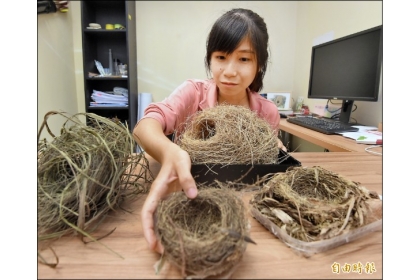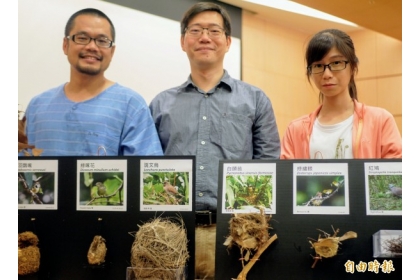Bird nest’s impact on the evolution of bird species- female college student’s research article has made it to the international journal
2018-05-30
興新聞張貼者
Unit秘書室
2,697
21-year old Yi-Ting Fang(方怡婷), surrounded by 242 bird species and more than 8,000 different types of bird nests, is currently a third year student of the Department of Life Sciences at the National Chung Hsing University (NCHU). She recently made headline in the domestic academia community as a research article of her being the first author, on methods of birds’ nest and bird species evolution was published in the May edition of a renowned journal “Nature Communications”.
Yi-Ting Fang systematically complied more than 8000 types of birds’ nest
Yi-Ting Fang and assistant researchers from the Biodiversity Research Center, Academia Sinica, Chih-Ming Hung(洪志銘)and Mao-Ning Tuanmu(端木茂甯), compiled a list of collected data on more than 8,000 types of birds’ nest. The research is based mainly on three characteristics that include structure, location and attachment site and found that the history of birds’ nest and evolution of bird species are highly correlated.
In the past, academic studies on birds’ nest tend to look into one kind of characteristic and by analyzing three types of characteristics, Yi-Ting Fang, Chih-Ming Hung and Mao-Ning Tuanmu’s research study is regarded as more comprehensive. As compared to previous studies, their research also evidently provides a closer and more direct relevance of between evolution of bird’s nest and bird species and thus, the research study achieved recognition academically and was published in one of the top three international journals, the “Nature Communications”.
Close relevance between evolution of bird’s nest and bird species
Yi-Ting Fang, who is seemingly shy, speaks in a soft tone and smiles coyly, lights up with confidence and becomes chatty when she starts talking about her most favorite living organism. She said she joined the biology research club when she was studying in 景美女中 and it had triggered her curiosity on the study of bird species. She later then applied an intern position at the Biodiversity Research Center, Academia Sinica during summer when she was a NCHU freshman.
The short two-month summer internship had finished even before she could finish her research work, Yi-Ting Fang decided to continue working with the professor and did not realized that the research work took two years and eventually was accepted to an international journal. She said, “the process has given me not only an opportunity to enjoy the fun in researching work but also, a sense of accomplishment when I found myself being able to push forward based on the result findings of the research development.” With regards to being the first author, Yi-Ting Fang felt somewhat embarrassed and she said that the professor has contributed many ideas and she proceeded to getting those ideas realized. However, her professor was even kinder and said that, “we only talk, she is the one who specifically did all the analytical work.”
Yi-Ting Fang deserving the first author, her professor said
Yi-Ting Fang is Chih-Ming Hung’s first academic advising student. He said that the research team uses the acclaimed “Handbook of the Birds of the World” and from it, compiled more than 8000 types of bird’s nest. It is actually rather tedious job as she would need to keep updating all the data and when there is change in the data, she would have to do the analysis all over again.” Chih-Ming Hung said that from his perspective, Yi-Ting Fang definitely deserves to be the first author and emphasized again that they are the ones providing the ideas, but she is the one doing the implementing work and eventually completing the research. Chih-Ming Hung further said sometimes Mao-Ning Tuanmu and he would come up with really unattainable ideas but Yi-Ting Fang would confront the challenges and taking steps to complete the research work. Mao-Ning Tuanmu said that she always took the initiative to learn and possesses good qualities of being a professional researcher.
Yi-Ting Fang systematically complied more than 8000 types of birds’ nest
Yi-Ting Fang and assistant researchers from the Biodiversity Research Center, Academia Sinica, Chih-Ming Hung(洪志銘)and Mao-Ning Tuanmu(端木茂甯), compiled a list of collected data on more than 8,000 types of birds’ nest. The research is based mainly on three characteristics that include structure, location and attachment site and found that the history of birds’ nest and evolution of bird species are highly correlated.
In the past, academic studies on birds’ nest tend to look into one kind of characteristic and by analyzing three types of characteristics, Yi-Ting Fang, Chih-Ming Hung and Mao-Ning Tuanmu’s research study is regarded as more comprehensive. As compared to previous studies, their research also evidently provides a closer and more direct relevance of between evolution of bird’s nest and bird species and thus, the research study achieved recognition academically and was published in one of the top three international journals, the “Nature Communications”.
Close relevance between evolution of bird’s nest and bird species
Yi-Ting Fang, who is seemingly shy, speaks in a soft tone and smiles coyly, lights up with confidence and becomes chatty when she starts talking about her most favorite living organism. She said she joined the biology research club when she was studying in 景美女中 and it had triggered her curiosity on the study of bird species. She later then applied an intern position at the Biodiversity Research Center, Academia Sinica during summer when she was a NCHU freshman.
The short two-month summer internship had finished even before she could finish her research work, Yi-Ting Fang decided to continue working with the professor and did not realized that the research work took two years and eventually was accepted to an international journal. She said, “the process has given me not only an opportunity to enjoy the fun in researching work but also, a sense of accomplishment when I found myself being able to push forward based on the result findings of the research development.” With regards to being the first author, Yi-Ting Fang felt somewhat embarrassed and she said that the professor has contributed many ideas and she proceeded to getting those ideas realized. However, her professor was even kinder and said that, “we only talk, she is the one who specifically did all the analytical work.”
Yi-Ting Fang deserving the first author, her professor said
Yi-Ting Fang is Chih-Ming Hung’s first academic advising student. He said that the research team uses the acclaimed “Handbook of the Birds of the World” and from it, compiled more than 8000 types of bird’s nest. It is actually rather tedious job as she would need to keep updating all the data and when there is change in the data, she would have to do the analysis all over again.” Chih-Ming Hung said that from his perspective, Yi-Ting Fang definitely deserves to be the first author and emphasized again that they are the ones providing the ideas, but she is the one doing the implementing work and eventually completing the research. Chih-Ming Hung further said sometimes Mao-Ning Tuanmu and he would come up with really unattainable ideas but Yi-Ting Fang would confront the challenges and taking steps to complete the research work. Mao-Ning Tuanmu said that she always took the initiative to learn and possesses good qualities of being a professional researcher.



